Alexander's Most Lasting Achievement Was
Alexander the Swell: Facts, biography and accomplishments
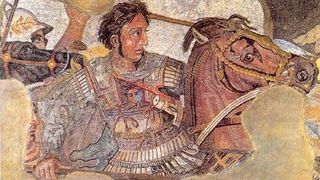
Alexander the Not bad was king of Macedonia from 336 B.C. to 323 B.C. and conquered a huge empire that stretched from the Balkans to modern-day Pakistan.
During his reign, Alexander the Nifty had a massive bear upon in his time and sent ripples into the future. "In a reign of 13 years Alexander shot across the Greek and Heart Eastern firmament like a shooting star, transforming whatever he — ofttimes brutally — touched and ensuring the ancient world then eventually our world could never be the aforementioned again," Paul Cartledge, A.G. Leventis professor of Greek culture at Cambridge University, wrote in All About History (opens in new tab) mag.
Alexander's triumphs also fabricated him a legendary figure and an inspiration for future generations. "Until the internet age, Alexander the Great was probably the virtually famous man being who ever lived," Cartledge wrote. "His phenomenal career of conquest inspired not only Caesar and Augustus but also Marker Antony, Napoleon, Hitler and other would-exist world conquerors from the Due west."
Related: Has the tomb of Alexander the Great's mom been constitute?
Yet, despite his military accomplishments, aboriginal records say that he failed to win the respect of some of his subjects, wrote Pierre Briant, emeritus professor of history at Collège de France, in "Alexander the Great and His Empire (opens in new tab)" (Princeton University Press, 2010) and, furthermore, he had some of the people closest to him murdered.
"The personality of Alexander the Great was a paradox," Susan Abernethy of The Freelance History Author (opens in new tab) told Alive Science. "He had great charisma and forcefulness of personality simply his character was full of contradictions, peculiarly in his later on years (his early 30s). However, he had the ability to motivate his army to do what seemed to be impossible."
Where was Alexander the Great from?
Alexander was born around July 20, 356 B.C., in Pella in modern-day northern Hellenic republic, which was the authoritative majuscule of ancient Macedonia. He was the son of King Philip II and Olympias (one of Philip's vii or eight wives) and was brought up with the belief that he was of divine nascency. "From his earliest days, Olympias had encouraged him to believe that he was a descendent of heroes and gods. Aught he had accomplished would have discouraged this belief," wrote Guy MacLean Rogers, a professor of classics at Wellesley College, Massachusetts, in his book "Alexander (opens in new tab)" (Random House, 2004).
Alexander's father was often away, acquisition neighboring territories and putting downwards revolts. Nevertheless, Male monarch Philip Two of Macedon was 1 of Alexander's most influential office models, Abernethy said. "Philip ensured Alexander was given a noteworthy and pregnant education. He bundled for Alexander to be tutored past Aristotle himself … His teaching infused him with a honey of knowledge, logic, philosophy, music and culture. The teachings of Aristotle [would later aid] him in the treatment of his new subjects in the empires he invaded and conquered, allowing him to adore and maintain these disparate cultures."
Alexander watched his father entrada nearly every twelvemonth and win victory later on victory. Philip remodeled the Macedonian army from denizen-warriors into a professional person organization, wrote Ian Worthington, professor of history and archaeology at Macquarie University, in "Philip II of Republic of macedonia (opens in new tab)" (Yale University Press, 2010). Philip suffered serious wounds in battle, such as the loss of an heart, a cleaved shoulder and a damaged leg, according to Worthington.
Philip decided to leave his 16-twelvemonth-old son in charge of Macedonia while he was away on entrada, Cartledge wrote in his book "Alexander the Great (opens in new tab)" (Overlook Press, 2004). Alexander took advantage of the opportunity by defeating a Thracian people called the Maedi and founding "Alexandroupolis," a city he named after himself.
"Alexander felt the need to challenge his father's authority and superiority and wished to out-practice his father," Abernethy said.
Aboriginal records, such as Plutarch'southward "Lives (opens in new tab)," point that Alexander and Philip became estranged afterwards in Alexander's teenage years. "Alexander may have resented his father's many marriages and the children built-in from them, seeing them every bit a threat to his own position," said Abernethy. At one point his female parent Olympia was exiled to Epirus in western Greece.
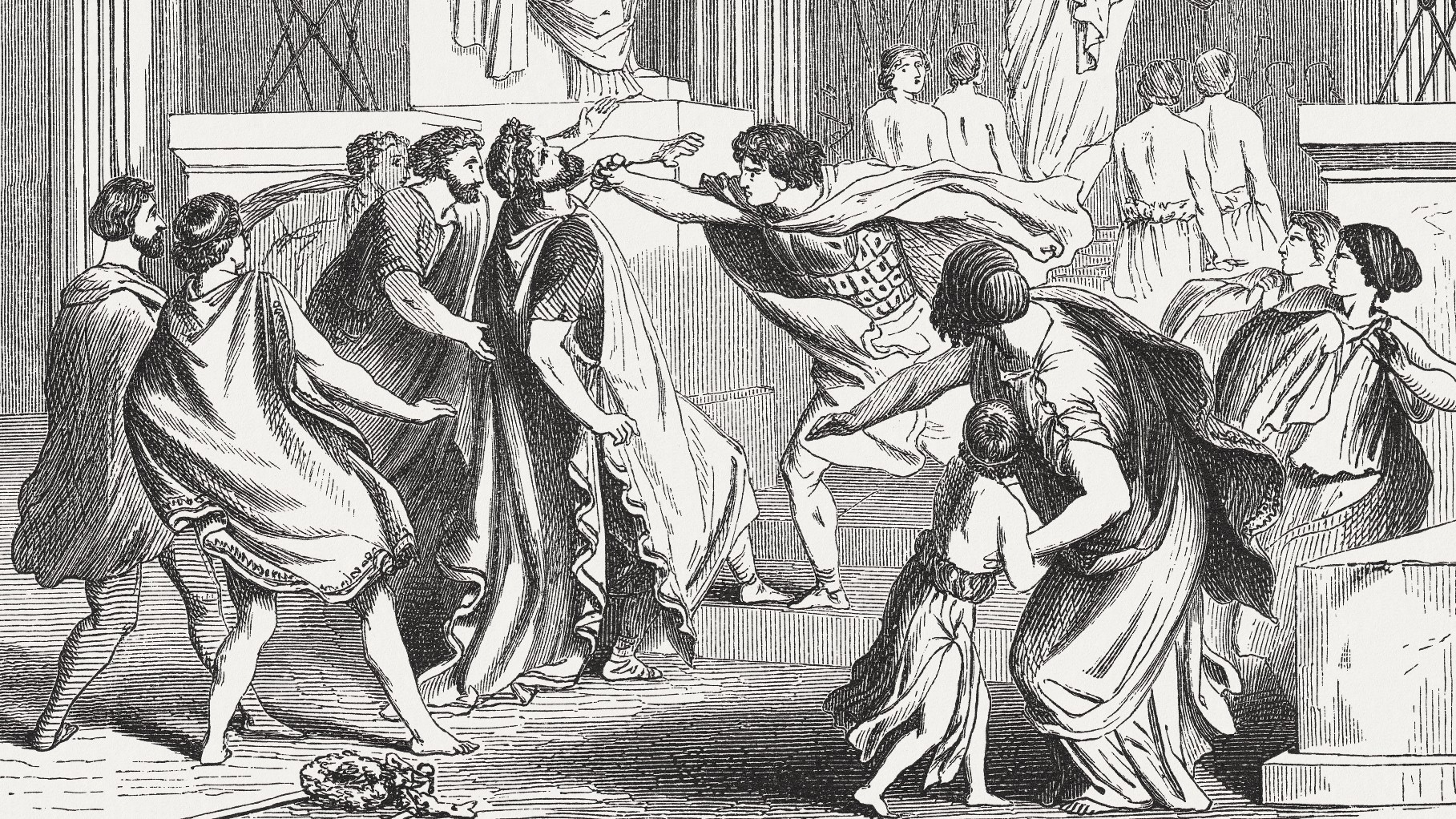
Philip was assassinated in 336 B.C. while celebrating the nuptials of his daughter Cleopatra (not the famous Egyptian pharaoh). The person who stabbed him was said to have been one of Philip's former male lovers, named Pausanias. While the ancient Greek historian Cleitarchus pointed to jealousy and betrayal equally the motive, as outlined past Diodorus Siculus in "Library of History (opens in new tab)," other aboriginal sources like Justin in "Epitome of the Philippic History Of Pompeius Trogus (opens in new tab)" suspected that Pausanias may have been part of a larger plot to kill the male monarch — one that may take included Alexander and his mother.
At the time of his death, Philip was contemplating invading the Persian Empire, besides known every bit the Achaemenid Empire, which at its peak stretched from the Balkan peninsula to modern-mean solar day Islamic republic of pakistan and had repeatedly attempted to conquer the Greek world. Philip'south dream was passed onto Alexander, partly via his mother Olympias, co-ordinate to Abernethy. "She fostered in him a burning dynastic ambition and told him information technology was his destiny to invade Persia."
Upon his father's expiry, Alexander moved quickly to consolidate ability. He gained the support of the Macedonian ground forces and intimidated the Greek metropolis states that Philip had conquered into accepting his rule. Later on campaigns in the Balkans and Thrace, Alexander moved against Thebes, a city in Greece that had risen up in rebellion. He conquered it in 335 B.C. and had the city destroyed.
With Greece and the Balkans pacified, he was ready to launch a campaign against the Persian Empire.
Conquering the Persian Empire
While Alexander may have had his own reasons for expanding eastward, "his official reason for wanting to conquer the Achaemenid Farsi Empire… was to lead the centrolineal Greeks in a war of liberation: to free forever from Persian control the Greek cities along the Anatolian declension and on the isle of Cyprus, and in then doing likewise to exact revenge for the Persians' invasion of Greece under Great King Xerxes in 480-479 BCE," Cartledge wrote.
But ironically, Alexander oftentimes fought Greek mercenaries while campaigning confronting Darius III, the king of Persia. Even more than ironically, Sparta, a metropolis that had famously lost its king and 300 warriors in the Battle of Thermopylae during a Persian invasion attempt, also opposed Alexander, going and then far equally to seek Persian help in the Spartans' efforts to overthrow him, co-ordinate to Siculus.
Nevertheless, Alexander was hugely successful against Persia. The first major boxing he won against the Perisans was in 334 B.C. at the Battle of Granicus, fought in mod-mean solar day western Turkey, non far from the ancient city of Troy. The ancient Greek historian Arrian wrote that Alexander defeated a force of 20,000 Farsi horsemen and an equal number of foot soldiers. He then avant-garde down the coast of due west Turkey, taking cities and depriving the Farsi navy of bases.
The second fundamental boxing he won — and perhaps the most important — was the Battle of Issus, fought in 333 B.C. most the ancient town of Issus in southern Turkey, close to modern-day Syrian arab republic. In that battle, the Persians were led by Darius 3 himself. Arrian estimated that Darius had a force of 600,000 troops (probably wildly exaggerated) and initially positioned himself on a groovy evidently where he could mass his strength effectively against Alexander, who hesitated to give battle.
Darius is said to have thought this as a sign of timidity. "One courtier later on another incited Darius, declaring that he would trample down the Macedonian ground forces with his cavalry," Arrian wrote. So, Darius gave up his position and chased Alexander. At start this went well, and Darius'southward soldiers got in the rear of Alexander's force. However, Darius's regular army had been led to a narrow spot where the Persians could not apply their superior numbers effectively, and at that point Alexander moved his force against the Persians. Alexander's experienced army proved as well stiff for the Farsi force, and eventually Darius fled, along with his army.
In his haste, Darius left much of his family behind, including his mother, wife, infant son and two daughters. Alexander ordered that they exist "honored, and addressed as royalty," Arrian wrote. After the battle, Darius offered Alexander a ransom for his family and alliance, through marriage.
Arrian wrote that Alexander rebuked Darius in writing, saying "in the future whenever y'all send word to me, address yourself to me as Rex of Asia and not as an equal, and permit me know, as the master of all that belonged to you, if y'all have need of anything."
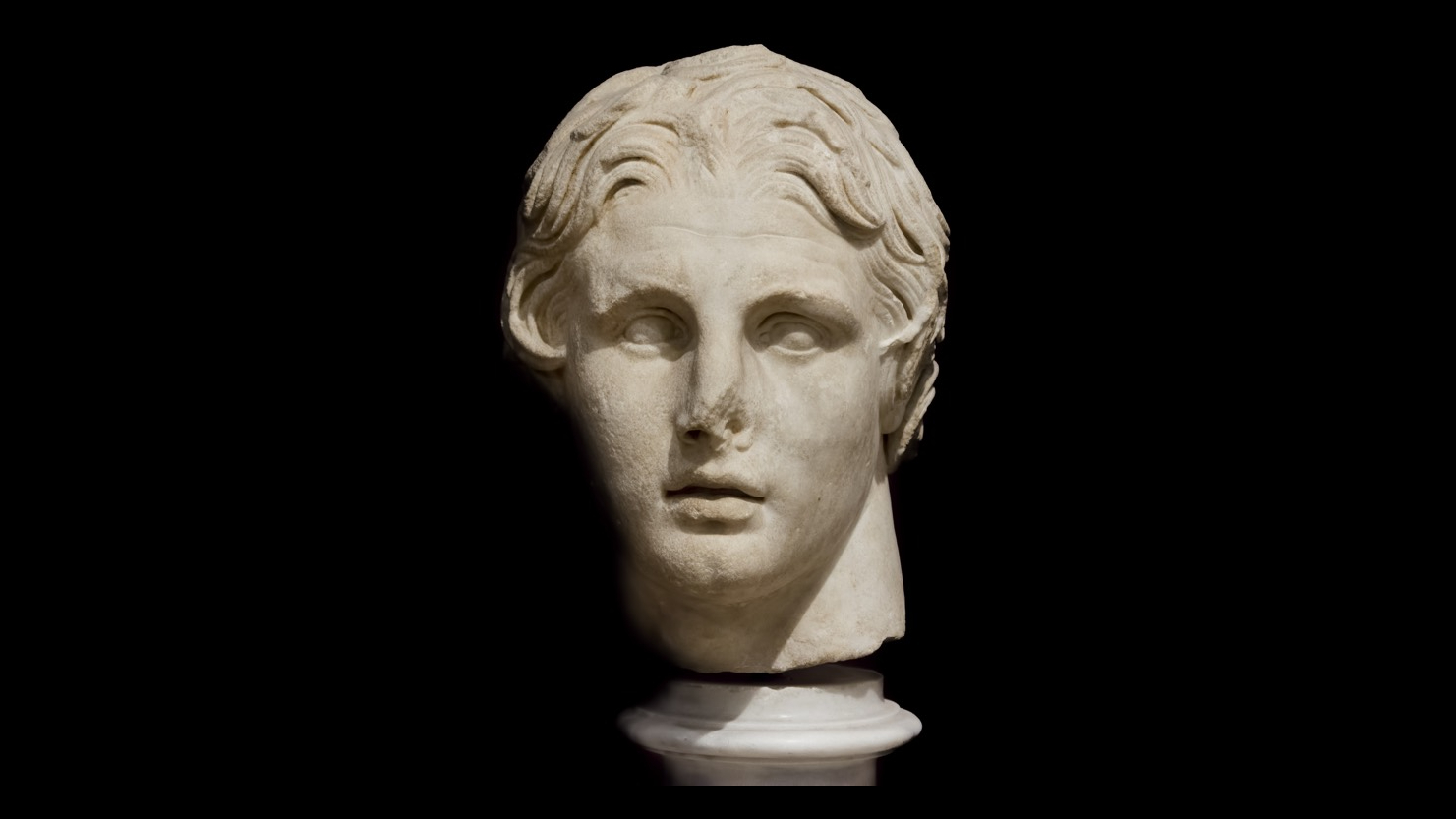
Pharaoh of Egypt
Alexander and then moved south along the eastern Mediterranean, continuing a strategy designed to deprive the Persians of their naval bases. Many cities surrendered, but some, such as Tyre, which was on an island in modern-day Lebanese republic, put upward a fight and forced Alexander to lay siege.
In 332 B.C., after Gaza was taken by siege, Alexander entered Arab republic of egypt, a country that had experienced on-and-off periods of Persian rule for two centuries. On its northern declension, he founded Alexandria, the most successful metropolis he ever built. Arrian wrote that "a sudden passion for the project seized him, and he himself marked out where the agora was to exist built and decided how many temples were to be erected and to which gods they were to be defended…".
Alexander claimed the title of pharaoh, and according to Cartledge, looked to attach himself to the line of Egyptian rulers through a traditional ceremony. "Most certainly he had himself crowned pharaoh in the old Egyptian capital of Memphis, thereby non simply ingratiating himself with the Egyptian masses just as well enfolding the erstwhile and withal powerful Egyptian priesthood in the embrace of his new Egyptian monarchy," Cartledge wrote.
Battle of Gaugamela
With the eastern Mediterranean and Egypt under his command, , Alexander successfully deprived the Persians of naval bases and was gratuitous to move inland to conquer the eastern half of the Persian Empire.
At the Battle of Gaugamela, fought in 331 B.C. in northern Iraq near present-day Erbil, Alexander faced as many every bit 1 meg troops, according to Arrian (mod scholars' estimates vary only put the total closer to 100,000 against roughly 50,000 soldiers for Alexander). Darius brought soldiers from all over his empire, and fifty-fifty beyond. Scythian horsemen from the Persian Empire'south northern borders faced Alexander, as did "Indian" troops (as the ancient writers called them) who were probably from modern-day Islamic republic of pakistan.
The boxing soon became a war of nerves. "For a brief flow the fighting was mitt to hand, but when Alexander and his horseman pressed the enemy hard, shoving the Persians and striking their faces with spears, and the Macedonian phalanx, tightly arrayed and bristling with pikes, was already upon them, Darius, who had long been in a state of dread, now saw terrors all around him; he wheeled about — the commencement to do and then — and fled," Arrian wrote. From that signal on the Persian regular army started to collapse and the Persian king fled, with Alexander in hot pursuit.
Darius was later betrayed by i of his satraps, or regional governors, named Bessus (who then claimed kingship over what was left of Persia), and was killed by his ain troops in 330 B.C..
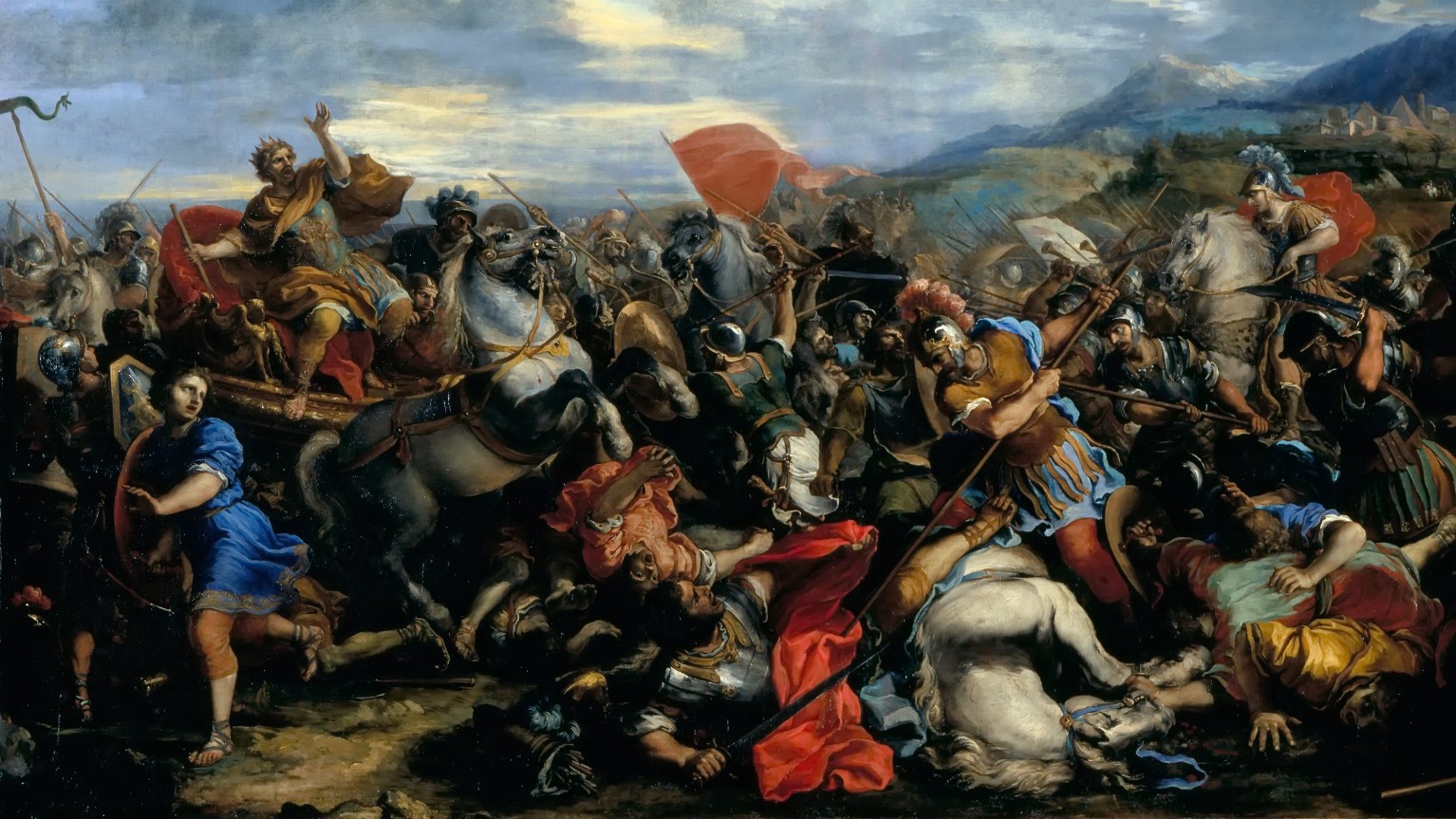
Alexander wanted a peaceful transition of power in Persia following Darius'southward defeat. He needed to have the advent of legitimacy to gratify the people, so Alexander provided a noble burial for Darius.
"[Providing noble burials] was a mutual practice past Alexander and his generals when they took over the rule of dissimilar areas of the empire," Abernethy said.
Alexander was influenced by the teachings of his tutor, Aristotle, whose philosophy of Greek ethos did not require forcing Greek culture on the colonized. "Alexander would accept away the political autonomy of those he conquered merely not their culture or way of life. In this way, he would proceeds their loyalty by honoring their culture, fifty-fifty after the conquest was complete, creating security and stability. Alexander himself even adopted Persian wearing apparel and certain Farsi customs," Abernethy said.
Wishing to comprise the most easterly portions of the Persian Empire into his own, Alexander campaigned in central Asia from 330 and 327 B.C.. It was a rocky, frost-bitten conflict, which raised tensions within his own regular army, and led to Alexander killing two of his closest friends.
Why did Alexander kill his friends?
Alexander killing Parmenio, his one-time second in command, and Cleitus, the Macedonian king'south close friend who is said to have saved his life at the Battle of Granicus, may be seen as a sign of how Alexander's men were becoming tired of campaigning, and how Alexander was becoming increasingly paranoid.
At some point during Alexander's campaign in primal Asia, Parmenio's son, Philotas, allegedly failed to report a plot against Alexander'southward life. The rex, incensed, decided to kill not only Philotas and the other men accounted conspirators, but likewise Parmenio, fifty-fifty though he apparently had zero to do with the alleged plot.
Co-ordinate to the start-century A.D. author Quintus Curtius (every bit institute in "Alexander The Great: Selections from Arrian, Diodorus, Plutarch, and Quintus Curtius (opens in new tab)," Hackett Publishing, 1800), Alexander tasked a homo named Polydamas, a friend of Parmenio, to perform the deed, holding his brothers hostage until he murdered Parmenio. Arriving in Parmenio's tent in the urban center where he was stationed, Polydamas handed him two letters: ane from Alexander and 1 from Parmenio'southward son.
When Parmenio was reading the alphabetic character from his son, a general named Cleander, who aided Polydamas with his mission, "opened him (Parmenio) up with a sword thrust to his side, then struck him a second blow in the throat…" killing him, Quintus Curtius wrote.
A second prey of Alexander's fury was his friend Cleitus, who was angry at Alexander for adopting Persian dress and community. Afterwards an episode where the ii were drinking, Cleitus scolded the king, telling him, in essence, that he should follow Macedonian ways, not Persian customs.
Cleitus lifted up his right hand and said, "this is the paw, Alexander, that saved you then (at the Battle of Granicus)," according to Arrian. Alexander, infuriated, killed him with a spear or pike.
Alexander took his act of murder terribly. "Once again and over again, he called himself his friend'due south murderer and went without nutrient and beverage for iii days and completely neglected his person." Arrian wrote.
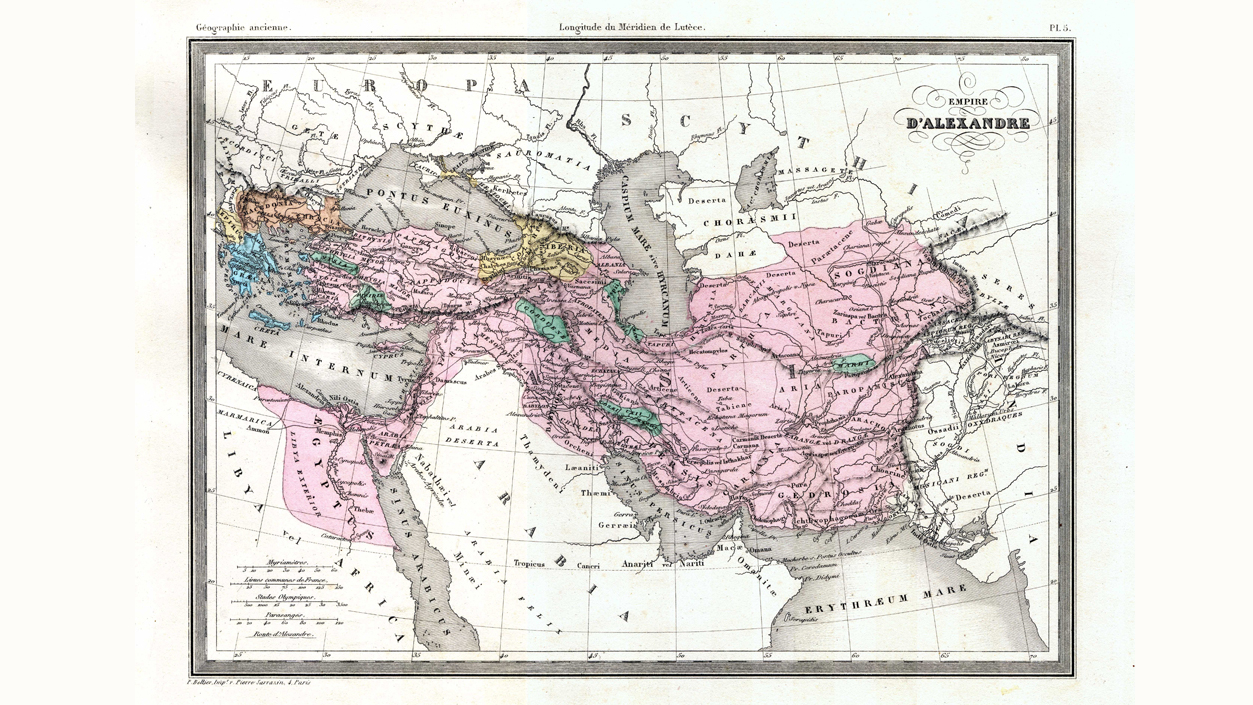
Alexander's final battles
Alexander's days in primal Asia were not all unhappy. Afterwards his troops had captured a fortress at a identify called Sogdian Rock in modern-day Uzbekistan in 327 B.C. he met Roxana, the daughter of a local ruler. The 2 married, and they had an unborn son at the time of Alexander's death.
Despite his men's fatigue, and the fact that he was far from habitation, Alexander pressed on into a country that the Greeks chosen "India" (what is now present-day Pakistan). Plutarch explained in "The Life of Alexander the Corking (opens in new tab)" that he made an brotherhood with a local ruler named Taxiles, who agreed to allow Alexander to apply his city, Taxila, every bit a base of operations. He also agreed to give Alexander all the supplies he needed — which was very useful given Alexander's long supply lines.
In exchange, Alexander agreed to fight Porus, a local ruler who gear up out against Alexander with an army that reportedly included 200 elephants. The two armies met at the Hydaspes River in 326 B.C. Alexander bided his time; he scouted the area, built up a armada of ships and lulled Porus into a false sense of security.
When Porus mobilized his forces he found himself in a predicament; his cavalry was not as experienced equally Alexander's. Every bit such, he put his 200 elephants — animals the Macedonians had never faced in large numbers — up front.
Alexander responded by using his cavalry to set on the wings of Porus'south forces, quickly putting Porus'southward cavalry to flight. The event was that Porus's cavalry, foot soldiers and elephants eventually became jumbled together. Making matters worse for Porus, Alexander's soldiers attacked the elephants with javelins, and the wounded elephants went on a rampage, stomping on both Alexander and Porus'due south troops.
With his army falling autonomously, Porus stayed until the end and was captured. Arrian wrote that Porus was brought to the Macedonian male monarch and said, "treat me like a king, Alexander." Alexander, impressed with his bravery and words, made him an marry.
The journey home
In 324 B.C., Alexander'southward close friend, general and bodyguard Haphaestion died suddenly from fever. Haphaestion'due south death caused a desperate alter in Alexander's personality, Abernethy said. "Alexander had ever been a heavy drinker and the substance abuse began to have its toll. He lost his self-control and his compassion for his men. He became reckless, self-indulgent and inconsistent, causing a loss of loyalty by his men and officers. He had ever had a violent temper and been rash, impulsive and stubborn. The drinking made these traits worse."
Under such conditions, many of his men insisted that Alexander plough back abode, co-ordinate to Abernethy. Sailing south down the Indus River, he fought a group called the Malli and was severely wounded later on he led an attack against their urban center wall. After reaching the Indian Ocean he split his force in three. One chemical element, with the heavy equipment, would take a relatively condom road to Persia, the second, under his command, would traverse Gedrosia, a largely uninhabited deserted expanse that no big force had ever crossed before. A third strength, embarked on ships, would support Alexander'due south strength and sail alongside them.
The Gedrosia crossing was a miserable failure, and upto 3-quarters of Alexander'due south troops died along the way. His armada was unable to proceed upward with the main strength due to bad winds. "The burning estrus and the lack of h2o destroyed a great part of the regular army and particularly the pack animals," Arrian wrote.
Why Alexander chose to atomic number 82 part of his force through Gedrosia is a mystery. It could merely exist because no one had always attempted to bring such a large strength through it before and Alexander wanted to be the first.
Render to Persia and death
Alexander returned to Persia, this time as the ruler of a kingdom that stretched from the Balkans to Egypt to modern-day Pakistan. In 324 B.C., he arrived in Susa in present-day Iran, where a number of his innermost directorate got married.
Alexander got married to two other women, in addition to Roxana, whom he had married in key Asia. I was Barsine, daughter of Darius III, and the other was a Persian woman Arrian identified as Parysatis. Roxana probable did non take kindly to her two new co-wives and, after Alexander's death, she may have had them both killed, Plutarch wrote.
In 323 B.C., Alexander was in Babylon in modernistic-24-hour interval Republic of iraq, and his side by side major war machine target was plainly to be Arabia on the southern end of his empire. In June 323 B.C., while he was readying troops, he caught a fever that would non go away. He shortly had trouble speaking and eventually died, with some suggesting he was poisoned. Even so, his death may have been announced prematurely, according Katherine Hall, a senior lecturer in the Department of General Exercise and Rural Health at the University of Otago in New Zealand.
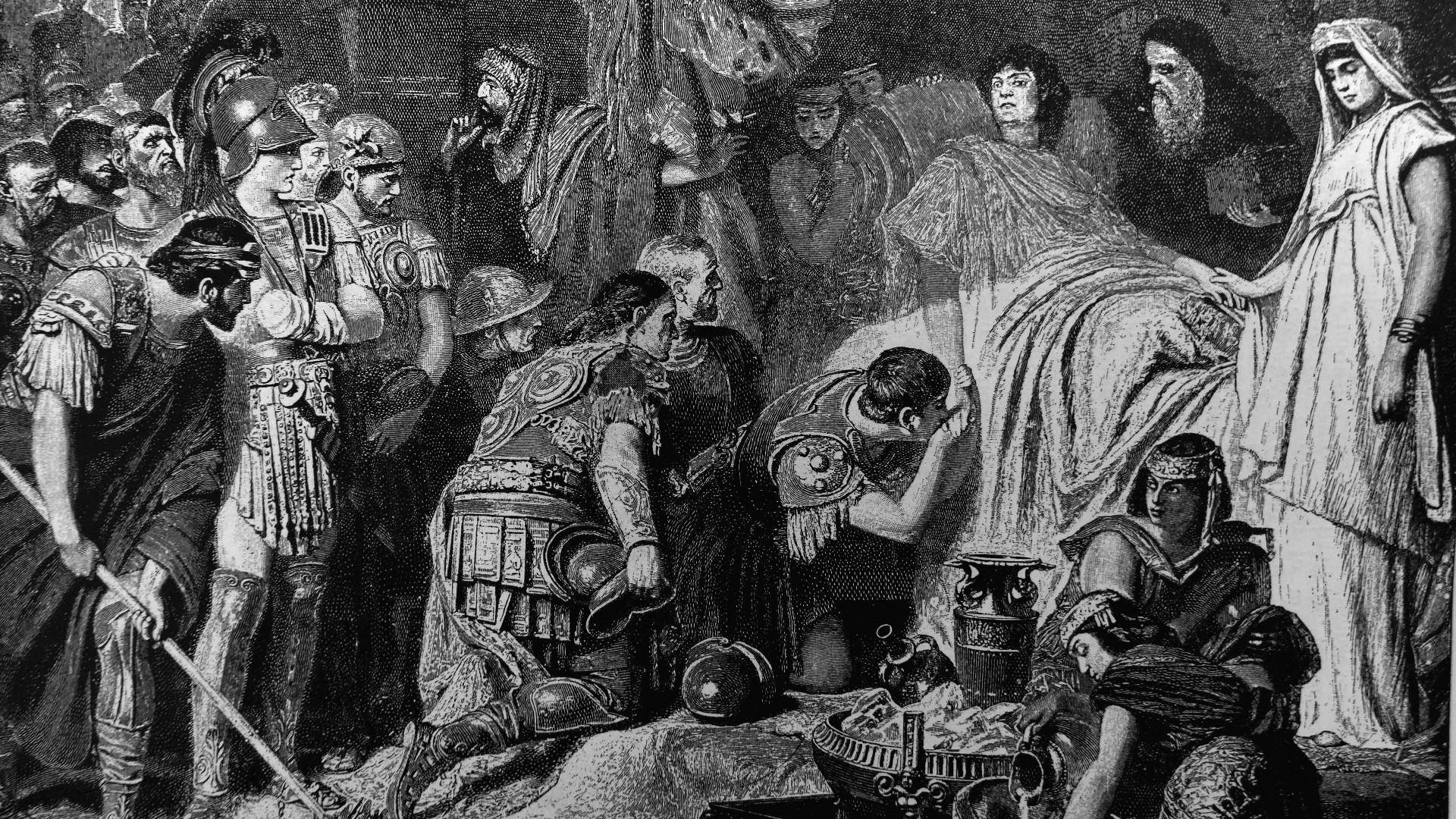
Soon earlier his death, Alexander was supposedly asked who his empire should become to. His reply was said to exist "to the strongest homo," although he had an unborn son. However, at that place was nobody potent enough to concord his empire together. "Alexander's untimely death, without whatsoever provision having been made for a smooth succession (if such were indeed possible), opened the floodgates for 2 generations of warfare among his marshals, generals and lieutenants for their piece of his hypertrophied empire," Cartledge wrote.
Alexander's legacy
"Possibly the about significant legacy of Alexander was the range and extent of the proliferation of Greek culture," Abernethy said. "The reign of Alexander the Great signaled the beginning of a new era in history known as the Hellenistic Age. Greek civilisation had a powerful influence on the areas Alexander conquered."
Many of the cities that Alexander founded were named Alexandria, including the Egyptian urban center that is now dwelling to more than 4.5 million people. The many Alexandrias were located on trade routes, which increased the flow of commodities between the Eastward and the West.
Alexander'south legacy remains alive today, according to Cartledge, and is reimagined and reinterpreted past each generation; "In that location have been many Alexanders, as many as there have been observers, enemies, admirers, worshippers or serious students of the human, and hero, and god."
Additional reporting by Jessie Szalay, Alive Science contributor, and Jonathan Gordon, Editor of All About History.
Alexander's Most Lasting Achievement Was,
Source: https://www.livescience.com/39997-alexander-the-great.html
Posted by: morganhishe1987.blogspot.com


0 Response to "Alexander's Most Lasting Achievement Was"
Post a Comment